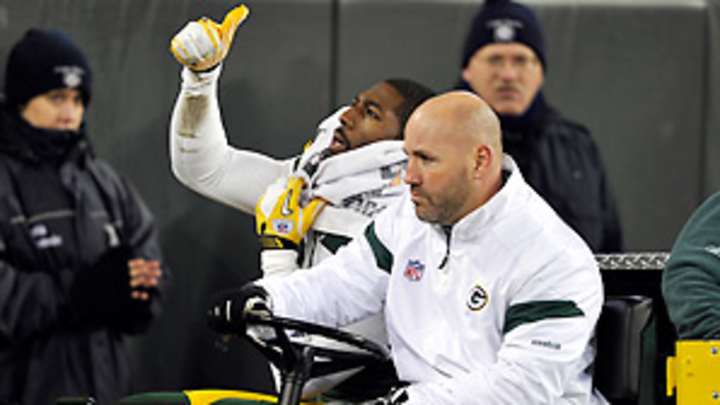Greg Jennings trade would not make much sense for Packers

Greg Jennings had 949 yards and nine touchdowns after missing three games in 2011. (Jeff Hanisch-US PRESSWIRE)
Greg Jennings is in the final year of his contract and, unless he opts to take a hometown discount, probably will want more money starting in 2013 than the Packers are able to give him. So, from that perspective, the idea that Green Bay should look to trade Jennings -- an idea pitched by the Milwaukee Journal Sentinel's Bob McGinn -- makes sense.
The Packers likely won't be able to afford Jennings, so they may as well try to get something for him while they can.
But all due respect to McGinn, one of the more trusted beat writers out there, the notion of trading Jennings does not make a lot of sense for Green Bay, for a number of reasons ...
1. The Packers are Super Bowl contenders
I'm not exactly going out on a limb with that declaration, even with the Packers coming off a home loss to San Francisco. McGinn wrote that Green Bay would "benefit immensely" from keeping a healthy Jennings around this season, but that "general managers ... are paid to think long term." At some point, though, the payoff in the present of a potential move has to be considered.
Dealing Jennings, the team's top wide receiver when he's at 100 percent (something that, granted, he has not been consistently since 2010), would be a huge blow to the Green Bay offense. Jordy Nelson has emerged as an elite NFL receiver, James Jones continues to be a solid contributor and Randall Cobb appears ready to take the next step. But none has the proven game-breaking ability that Jennings has shown throughout his career.
Unloading him mid-season for a draft pick or two -- which is what Green Bay would likely get in return -- would constitute a major step back for the Packers' offense, right in the midst of a Super Bowl run. With Jennings, Green Bay has perhaps the most explosive offense in football; without him, the Packers slip back a few notches.
2. Green Bay could utilize the franchise tag
Jennings told CBSSports.com earlier this month that he "would be disappointed" if the Packers hit him with the franchise tag in 2013. But it remains an option for Green Bay. This year's WR tag fell at around $9.5 million. Even if that number goes up slightly next offseason, the one-year price on Jennings likely would be cheaper than the long-term deal Jennings will seek.
The Packers would run the risk of a holdout, of course, or a disgruntled Jennings. They also could give themselves more time to negotiate a long-term contract by using the franchise tag; Green Bay could franchise Jennings, then look to trade him, as many people expected to happen with Matt Flynn after the 2011 season.
Trading for a franchise-tagged player is an expensive proposition for any team, but this is an option Green Bay has in its back pocket.
3. Green Bay would still get a return on Jennings, even if he walked
The NFL's compensatory draft system provides a little bit of a fall-back help for a team, in the event that an elite free agent leaves. In Jennings' case, especially if the Packers did not aggressively pursue other free agents if their top WR departed as an unrestricted free agent, the Packers would be in line for a third- or fourth-round compensation pick.
Compare that to what Jennings, in a contract year, would fetch in a trade: Rotoworld pitches a "high second-round pick" as Green Bay's return in a hypothetical deal. Is a second-round pick and the loss of Jennings for the second half of 2012 a better situation than keeping Jennings and adding a third- or fourth-rounder?
That's a decision that the Packers might have to face at some point. From my perspective, the answer is no. Even if Green Bay acquired a high 2013 second-rounder, there are no guarantees that pick would turn into an impact player. Jennings already is an impact player. It's a high-risk, low-reward possibility.
******
This is not an easy situation for the Packers. They would love to keep Jennings around, since he has shown himself to be one of the best at his position in the NFL. From a financial standpoint, however, it will be difficult.

Chris Burke covers the NFL for Sports Illustrated and is SI.com’s lead NFL draft expert. He joined SI in 2011 and lives in Ann Arbor, Mich.